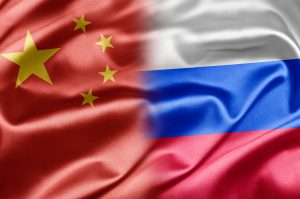The Diplomat author Mercy Kuo regularly engages subject-matter experts, policy practitioners, and strategic thinkers across the globe for their diverse insights into U.S. Asia policy. This conversation with Dr. Marcin Kaczmarski – a lecturer in security studies at the School of Social and Political Studies at the University of Glasgow and author of numerous publications, including “Russia and China in the Post-crisis International Order” (Routledge 2015) – is the 358th in “The Trans-Pacific View Insight Series.”
Analyze the scope and scale of strategic challenges from Russia and China facing U.S.-EU relations.
I will focus on challenges posed by Sino-Russian cooperation, on top of challenges stemming from Russia’s and China’s individual actions. A direct challenge of the Sino-Russian duo remains limited. Much more threatening is a set of indirect challenges.
Russia and China promote an alternative vision of international order, one clearly distinct from that upheld by the U.S. and the EU. Moscow and Beijing share dissatisfaction with the liberal international order. The two states have blocked attempts to maintain this order, especially at the U.N. Security Council, and have promoted an alternative vision that venerates absolute sovereignty.
China’s possible assistance to Russia in Europe and Russia’s reciprocation in Asia may complicate the U.S. and EU’s efforts to maintain peace and order in Europe and Asia alike, even if there is an asymmetry in how Russia and China approach each other’s regional hegemonic ambitions. Moscow explicitly supports China’s security policy toward Japan and South Korea in particular, by participating in joint exercises directed against those two states. Beijing does not reciprocate, staying away from Russia’s military brinkmanship in Europe.
Finally, joint Sino-Russian activities in third countries all over the world ̶ from the Balkans to the Middle East to sub-Saharan Africa ̶ negatively impact Western influence, although China and Russia tend to pursue parallel rather than coordinated policies.
Compare and contrast divergent agendas and approaches between Brussels and Washington in managing Moscow and Beijing.
Russia’s invasion against Ukraine has led to the emergence of a joint approach of the U.S. and the EU towards Moscow. Prior to the war we had witnessed serious divergence. Germany stuck to energy cooperation despite the U.S. opposition, towards the Nord Stream 2 in particular, whereas France looked for ways to reintegrate Russia in the architecture of the European security. The invasion has put an end to those differences.
Much more divergence surrounds Brussels and Washington’s approaches to Beijing. The U.S. seems to frame the relationship in terms of an intensifying rivalry, determined to slow down China’s technological advancements. Washington attempts to persuade its European allies to support this approach, for instance by blocking export of sensitive technologies to China.
The EU’s approach has moved from an enthusiastic embrace of China, observed in the early 2010s, towards a more cautious approach. Nonetheless, European countries remain divided on what kind of policy towards Beijing to adopt. Those seeing China as a security threat promote aligning the EU’s policy with that of the U.S. Those who recognize Beijing as a necessary economic partner and global governance participant insist on Europe pursuing a distinct policy, without subscribing to the U.S. approach.
Analyze Germany’s leaning in toward China and its implications for EU China policy.
As many of its European counterparts, German elites remain divided on how to approach China. For some, the breakdown of energy cooperation with Russia after February 24, 2022, is a cautionary tale and implies the need to limit Germany’s dependence on China as an export destination. Others still seem to believe that Beijing may be persuaded to take on a more responsible global political role, including as an intermediary in Russia’s war against Ukraine. Finally, some see China as an indispensable economic partner without which Germany cannot continue its economic performance.
Germany’s stance matters for the EU as a decisive shift in Berlin’s policy would significantly strengthen one of the sides in the European debate.
How are China and Russia using the Ukraine war to serve their geopolitical objectives?
To me, the geopolitical balance sheet of Russia’s invasion against Ukraine looks negative. Moscow’s failure to quickly win the war demonstrated all the weaknesses of Russian armed forces and laid bare all hidden failures of the modernization process. Moscow’s position in the post-Soviet space has weakened, in the South Caucasus and Central Asia in particular. Russia has showed that it still enjoys certain appeal in the Global South, but it is more due to the perception of the West as hypocritical than due to the belief in Russia’s righteousness.
For China, the war has brought more costs than benefits. The West has demonstrated unexpected unity and consistency in supporting Ukraine. The issue of Taiwan has been highlighted and the U.S. decided to step up its support. Beijing’s closest geopolitical partner has turned out to be unsuccessful. Washington’s attention has not been pulled away from Asia to the extent China would like to see.
Assess the impact of geostrategic contestation involving the U.S., EU, China, and Russia on the new world disorder.
A future configuration of international politics will depend on the outcome of the war in Ukraine. China does not want to be left alone vis-à-vis a reinvigorated West in case Russia suffers a failure in Ukraine. At the same time, Beijing is not ready to throw its economic and political weight beyond Moscow. The U.S. hopes to persuade the EU to join its policy towards China and forge a trans-Atlantic unity on this issue. The EU struggles to push back against Russia and cannot decide what policy towards China to pursue.
































